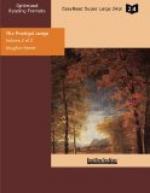“You reckon he means near all he says?” he had asked, his fat sides shaking.
“I’d take his word a heap quicker than I would most folks,” answered Mr. Saul with conviction.
Pegloe promptly had a sinking spell. He recalled the snuffing of the candles by the judge, an extremely depressing memory under the circumstances, also the reckless and headlong disregard of consequences which had characterized so many of that gentleman’s acts, and his plans shaped themselves accordingly, with this result: that when the judge took occasion to call at the tavern, and the hostile nature of his visit was emphasized by the cautious manner of his approach, he was greatly shocked to discover that his intended victim had sold his business overnight for a small lump sum to Mr. Saul’s brother-in-law, who had appeared most opportunely with an offer.
Pegloe’s flight created something of a sensation, but it was dwarfed by the sensation that developed a day or so later when it became known that Tom Ware and Colonel Fentress had likewise fled the country. Still later, Fentress’ body, showing marks of violence, was washed ashore at a wood-yard below Girard. It was conjectured that he and Ware had set out from The Oaks to cross the river; there was reason to believe that Fentress had in his possession at the time a considerable sum of money, and it was supposed that his companion had murdered and robbed him. Of Ware’s subsequent career nothing was ever known.
These were, after all, only episodes in the collapse of the Clan, sporific manifestations of the great work of disintegration that was going forward and which the judge, more than any other, perhaps, had brought about. This was something no one questioned, and he quickly passed to the first phase of that unique and peculiar esteem in which he was ever after held. His fame widened with the succeeding suns; he had offers of help which impressed him as so entirely creditable to human nature that he quite lacked the heart to refuse them, especially as he felt that in the improvement of his own condition the world had bettered itself and was moving nearer those sound and righteous ideals of morality and patriotism which had never lacked his indorsement, no matter how inexpedient it had seemed for him to put them into practice. But he was not diverted from his ultimate purpose by the glamour of a present popularity; he was able to keep his bleared eyes resolutely fixed on the main chance, namely the Fentress estate and the Quintard lands. It was highly important that he should go east to South Carolina to secure documentary evidence that would establish his own and Fentress’ identity, to Kentucky, where Fentress had lived prior to his coming to Tennessee.




